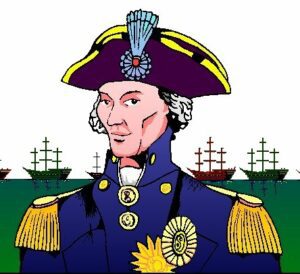
The Battle of Copenhagen went down in history because Horatio Nelson pulled off one of the boldest and most iconic acts of disobedience in naval history. In the battle with the chaos of war raging around him, Nelson, ever the maverick, put his telescope to his blind eye and quipped, “I see no signal.” This is recorded as one of the most famous acts of disobedience ever by a commander in the Royal Navy.
What happened?
Nelson was sent a signal by his superior officer, the haughty Admiral Hyde Parker, ordering him to disengage, this was because Parker feared they had lost the battle. However, Nelson had other ideas. So he turned to his flag captain, Thomas Foley, with a twinkle in his eye, he said, “You know, Foley, I only have one eye — I have the right to be blind sometimes.” And then, in a flourish of theatrical daring, he raised his telescope to his sightless eye and declared, “I really do not see the signal!”
This incredible defiance actually changed the course of the battle, and, of course, naval history.
The Outcome.
Well, he wasn’t reprimanded for disobeying a direct order, in actual fact his actions were the route to Nelson’s even greater achievements.
It was an action that sealed his reputation as Britain’s most daring naval commander, and the battle went down as one of his greatest victories.
How did it come to this?
By 1801, Europe was in the middle of the Napoleonic Wars, when a powerful coalition of northern nations, Russia, Prussia, Sweden, and Denmark came together to protect their shipping but, much more importantly for Britain, cut off its crucial supplies of Baltic timber. This timber was essential for the construction of British warships, the backbone of their naval supremacy. The route between Denmark and Sweden was the lifeblood of this timber trade, and the coalition’s blockade threatened to damage Britain’s naval ambitions.
To break the coalition and keep this vital supply line open, the British government sent a fleet to Copenhagen under Admiral Hyde Parker, with Nelson as his second-in-command.
Nelson’s Bold Plan
Nelson had a daring strategy, it was to strike at the heart of Denmark’s navy, their fleet was stationed in port, protected by shallow waters making it difficult for larger ships to approach. Admiral Parker’s flagship was too large to get close, so he was forced to watch the battle through the smoke of war. This was the problem as from this vantage point Admiral Parker could only see some of the battle, unfortunately he was convinced he was seeing British ships on fire, and it was for this reason, fearing disaster, that he sent the famous signal to retreat.
Defiance and Triumph
Admiral Parker never understood Nelson, who was a man of action, wasn’t about to retreat. He could smell victory amidst the smoke and chaos. His ships were holding strong, and he knew the Danish forces could still be beaten. This is why when Parker’s signal arrived, Nelson pretended not to see it, literally! Ignoring the order to withdraw, he pressed the attack, leading his fleet with ferociousness.
The result was stunning. Nelson’s fleet sunk fifteen Danish warships without losing a single one of their own. It shattered the coalition’s naval power and while even more importantly is secured Britain’s vital timber supplies.
A Hero Rewarded
For his nerve in defying his orders and delivering such a resounding victory, Nelson was not only spared any reprimand, but he was honoured with a viscountcy!
It was a bizarre yet fitting reward for a man whose entire career was defined by boldness, brilliance, and an indomitable will to win.

Our sister site Educational Musicals has published a musical about Nelson’s most famous and last battle, which you can download by clicking on Trafalgar – Nelson’s Finest Hour where you can listen to two of the 12 songs in the show.
Isn’t history fun!
10 Questions to discuss:
- Strategic Value: Beyond securing timber supplies, were there other strategic or political motivations for the British attack on Copenhagen?
- Civilian Casualties: While the blog focuses on naval losses, what was the impact of the battle on civilians in Copenhagen? Were there significant casualties or damage to the city?
- Danish Perspective: How did the Danes interpret Nelson’s actions and the outcome of the battle? Did it influence their relationship with Britain and other European powers?
- Long-Term Ramifications: Did the Battle of Copenhagen have any lasting effects on the Napoleonic Wars or the balance of power in Europe?
- Military Code of Conduct: How did Nelson’s actions challenge the established military code of conduct at the time? Did it spark debates about obedience and leadership in wartime situations?
- Alternative Tactics: Could Nelson have achieved his objective of weakening Denmark without resorting to a direct attack? Were there other feasible strategies under consideration?
- Technological Influence: What role did advancements in naval technology, such as ships and weapons, play in the outcome of the battle? How did it differ from previous naval engagements?
- Legacy of Nelson: While celebrated for his victory, has the historical assessment of Nelson’s actions and character evolved over time? Are there any controversies or critiques surrounding his legacy?
- Modern Relevance: Are there any parallels or lessons that can be drawn from the Battle of Copenhagen for understanding modern warfare and international relations?
- Further Research: What primary sources could you consult to gain a deeper understanding of the battle and its context, such as personal accounts, letters, or official reports?
These questions go beyond the immediate story of the battle and invite you to explore its wider historical significance and relevance to various aspects of warfare, leadership, and international relations.
For more on this click here:
© Tony Dalton

